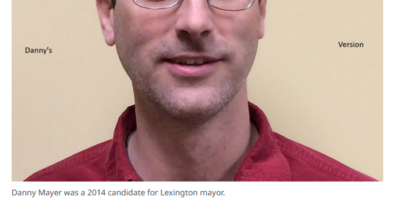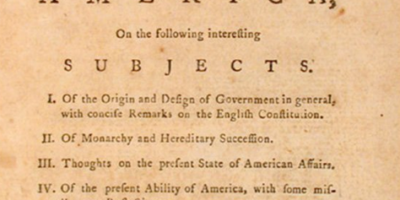In our last issue, Bruce Burris’s article “Tomb of the Unknowns,” which detailed the struggle to access cemetery records at Eastern State Hospital, generated a lot of reader response. We here reproduce some of these responses. Many detail the frustrating efforts to generate information about deceased loved ones who may (or may not) be buried on the site of Eastern State.
God bless Bruce Burris and Mary Hatton and all connected to this project. I have tried since 1984 to retrieve my Grandfather’s records who died in 1907 and have been told I will never find the records as the hospital does not want people to know how patients were buried there!
Anna Morgan
I pray that you are able to get those records released. I contacted the hospital a couple of years ago and was told it would take at least three or more months to locate the records. That’s as far as I got. I have been trying to obtain the records of a relative named Nannie E. Larkin who died in 1937. Census records show she lived at the East State Hospital.
Thank you for all of your work!
Linda Heinlein
My uncle died at ESH and was buried there in 1931. I found his death certificate at the state Archives. We can’t undo the disgraceful handling of human remains at the hospital, but it would seem appropriate for the state to erect a memorial for the unknowns who are buried there with the names and dates of those who are known. New names could be added when identified and verified.
Jimmy Helton
While researching the ancestors of my half sister I was told her grandfather disappeared in 1910, and was never heard from again. I found my sisters grandfather listed in the 1913 deaths at Eastern State Hospital. He was buried there as well.
The children of this man never knew what happened to their father. They were told by their mother that he left to find a job and would return to get them. As days turned to weeks and weeks to months, his small children couldn’t understand why their father never returned. Did he become ill or die along the steep mountainous roads? did he not want them, is that why he never returned? These questions remained unanswered for the life span of each child.
The grandchildren of this man would like to visit his grave and in some way try to make amends for the lost years and lies.
Sadly, this can not happen as burial records will not be released and another generation is left to deal with the questions of, where is he? what happened to him?
Jan Fugate
My Mother knew nothing much of her father that left the family due to circumstances. Her father Thomas Poff Jr. was never talked about because he died in an insane asylum. I got his death certificate & it says he died of Pellagra in 1917 & was buried on the grounds of Eastern State Hospital.
I asked a cousin in Lexington to take a picture of the grounds so I would at least be able to see them. She wrote back & sent articles about them destroying the graves when they put the road through.
My poor Grandfather was misunderstood in life then sent to an insane asylum because of a medical problem, and finally wasn’t able to “rest in peace” thanks to Bureaucracy.
I was floored when I learned that after all that was done to these poor souls they couldn’t even keep the grass mowed, and I thought that was the final disgrace. But not to allow you to go through the records compounds the indignities.
My thanks to ALL of you in this group who are fighting the good fight for those like my Grandfather. A special thanks to Mary Hatton who helped me get the scant paperwork of his stay there.
Dusty Pilgrim
My story with ESH is a little different from most.
Both my g-g-g-grandmother, Alice (Hunt) Kaut, and her brother, Howard Hunt, were both committed to ESH at different times in the late 1800s and both died there. We believe they both suffered from melancholia/depression.
When Alice died in 1909 and was buried at ESH, her children had a headstone placed and covered her grave in concrete with the knowledge that they would not be able to visit Lexington to care for her grave (her children lived in Greenup County, KY). They took a photo of her grave and this image was passed down through the generations along with the simple story that our Alice was buried at the asylum in Lexington.
My mother, Patricia (Boyle) Hoke was conducting family research in the early 1980s and knew Alice was buried at ESH. When she visited, she was told there wasn’t a cemetery on the property. She showed the representative the photo of Alice’s grave and representative continued to insist there was no cemetery on the grounds. Mom knew that wasn’t the case and never gave up trying to find our dear Alice.
In 1984, Mom finally located Alice’s grave when land was sold to IBM. IBM paid to have Alice (Hunt) Kaut’s remains relocated which included a new coffin, flowers and a hearse. My mother assembled our family and on a cold November day we brought Alice home to rest next to her daughter’s grave in our family cemetery.
We have never been able to locate Alice’s brother’s grave (Howard Hunt) and we haven’t given up hope that we will be able to bring him home to rest, too.
I’ve heard that patients’ bodies were donated to local schools for medical teaching/studies. What has happened to Howard Hunt? I want to know where his final resting place is with certainty, to be able to place flowers and honor his memory.
I’ve taken the steps to become the administratix of Alice’s estate in an attempt to locate her patient records. I’m particularly interested in these records for our family’s health, but also for our family’s history.
After all of these years, I have STILL not been able to obtain Alice’s records, but I’ll never give up.
I’ve never met Alice (she died in 1909) or been able to find a photo of her, but she is as real to me as any person. I’ve heard and researched her life for many years. In a way, Alice and Howard have haunted me — I feel that telling their story is a way to honor their memories and ease the suffering. As a descendant, I feel a responsibility to understand and preserve their history. Alice and Howard were someone’s children, someone’s parents, someone’s spouses and siblings to one another…they meant something very deeply to many people, including me.
My family’s history should not be kept from me. They MATTER to me and their lives are no less important than any other. I will always stand up for my family.
Who has the right to keep their stories hidden or charge their descendants for family information that is their birthright?
I’ve kept close watch for information on ESH and the Cemetery Preservation Project over the years. I cannot thank this group (and Mary Hatton in particular) for their diligence.
Kayt Schaefer
The horrific treatment of these poor souls breaks my heart. I was visiting a relative of a friend at the EKH in the early 1970s and even then it was heartbreaking seeing how the numerous patients were put in a small room together with hardly enough chairs to accommodate them all.
The 1940 census will be out in a year or two. The hospital patients should be listed hopefully. More leads?
Your goal is very important and not going unnoticed. When and if you come to Frankfort to dig for records I’d be honored to help. I don’t have any pull at the Ky Dept of Libraries and Archives but I’ll be behind you all the way.
Lynda Combs Gipson
I recently found my husband’s g g grandfather on the 1870 census. He was a patient there. He died bet 1870 – 1880 I believe. We never knew he was there. His name was Jessie Staples. I cannot go further until I can locate his records. I wish I knew what to do next if they will not help us. Thanks for all you are doing. This is a disgrace how they were treated. The least they could do now is to give info so the families know what happened.
Sue Brown
I applaud Mary, Bruce and Phil for all their efforts to restore “peace and dignity” to these many individuals who “because of an illness” that “no one wanted to talk about” ~ were forgotten!
I have several family members with severe mental illness, (SMI) diagnoses. It is unimaginable that only a few decades ago, they would have been locked away in a place where medical providers would recommend I not visit. Even today, medical providers often counsel family members to set up healthy boundaries and abandon their loved ones ~ since due to a KY law, they are allowed to become so ill the family is often at a loss on how to help their sick loved ones who suffer with these serious brain diseases.
We often hear that Kentucky is a leading the country in the treatment of heart disease and cancer ~ but when it comes to serious mental illness ~ we are on the bottom side of the US!
I have admired Bruce Burris’ crusade to not only locate the names of the dead at Eastern State Hospital, but also for his passion to embrace “all individuals” with disabilities. He has dedicated his life to helping individuals less fortunate, accel to their full potential. Our world would be a better place if we had “more individuals” like Bruce, Mary and Phil!
For all that feel pain for the souls society failed in the past 186 years ~ please be aware that “society” in Kentucky is still failing this population of people! For more information on how you can “also” help “the living” or so people with SMI can have timely accessibility to treatment, supportive services and housing, please educate yourself on how your tax dollars are being used. In 2010, due to our “least restricted mental health laws” too many with SMI are now homeless or live in our jails/prisons. Too often, state funding in directed into the Department of Corrections where it cost the state approximately $30,000 a year to house a person with SMI. Often these individuals are NOT violent criminals, but become a victim of their own illness ~ called the “revolving door!” Too often they end up in prison because they are not able to access treatment much less abide by rules/regulations of their probation or parole.
Essentially, the laws in Kentucky make a person who has no use of their legs, “run a marathon” to access a wheelchair ~ in terms how we expect a person with a serious brain disease to wade through a chaotic maze to receive the bare bones of something that resembles treatment.
I wish I could help Bruce’s efforts more, but someone needs to advocate for amendments to KY law, so those with SMI receive treatment while they are alive. We failed them in the late 1800s, early 1900s and yet even with all the modern advancement in science and technology we are still failing this population.
GG Burns
I should point out this is a problem with other state hospitals in Ky. Western State Hospital & the former Central State Hospital property. The cemeteries for those hospitals are also mostly unmarked & they refuse to give records to those that request them. The cemetery at the old Kentucky State Hospital has headstones, but I haven’t been there to confirm that, it’s now the Northpoint prison. The state hospitals as a whole in Kentucky have a horrible track record sadly. Although our group is Eastern State Hospital Cemetery Preservation Project, we plan on taking on all state hospital cemeteries.
Phil Tkacz




Rick Haslar
Hi,
I have just recently began research on my family roots. I already knew that my grandfather(John Preston Fields) died at Huntington State Hospital and have since read about its history .After further research I discovered that his grandfather(Preston Fields),my gg grandfather died at Eastern State Hospital on 2/6/1918. I saw his death certificate. Cause was given as “general paralysis of the insane”. From reading the above comments it sounds like that is all I’ll ever know?
Sandi Compton Mayo
My great great grandmother LouEmma Easterling Wolfe was said to have died at the East State Hospital in 1862 or 1863 during a brief stay. She was the mother of eight children by 1860 and her husband Reuben D. Wolfe, listed her as insane on the census. I suspect a thyroid disease complication, but will never truly know. I would appreciate participating in any help you may need in helping to distinguish her and many other’s remains. Thank you.
Mary Hatton
I thank everyone who has sent me names of relatives & stories. I love hunting for names & what happened to people who were patients at Eastern State Hospital. Even if your relative was not buried at Eastern State Hospital, I would greatly appreciate hearing from everone. My e-mail address is: hatton2009@gmail.com.
The website is: http://kykinfolk.com/esh/.
My co-ordinator & I talked with Nikki Burdine from Channel 18. This past week after more remains were discovered at Eastern State Hospital. Anytime there is news in the newspaper or on TV, I make copies for a scrapbook. I received a phone call from the Ashland, Ky. area. A small article was in the Ashland newspaper. I asked the lady to e-mail me a copy & I have the article. So if anyone finds a newspaper article in another county, Please, Please e-mail me the article.
I want to let everyone know since my last post in Dec. 2010 that Archives in Frankfort, Ky. has refused to research circuit court records for relatives for a circuit court commitment for a relative. Circuit Court Commitment’s are PUBLIC RECORD. A relative contacted me then I contacted Archives & was told the same info. This is totally wrong. Archives gets money researching for Ky. people & out of state people. As badly as the State of Ky. is hurting for money, I would think they would glad to do research for any one in-state or out-of- state.
I agree with Phil Tkacz. The markers at Western State Hospital were marked with wooden crosses. They have several cemeteries. All wooden markers were taking up and most sadly all wooden markers were burned. This is so sad.
Thanks,
Mary Hatton